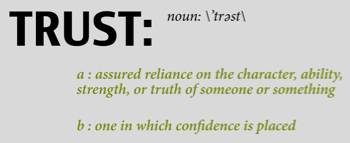
The Challenge of Trusting Leadership
The Challenge of Trusting Leadership
Exclamation point shaped cloud in a bright blue sky.
Photo courtesy of istockphoto/aleishaknight
What’s really in the way of your success in leading others?
When others see you lead, do they see the real you?
Are you living your passion and living it with authenticity?
Do you lead transparently?
Are you as good as your word?
Scott Weiss is President and CEO of Speakeasy, Inc., a global communication consulting firm. His book Dare: Accepting the Challenge of Trusting Leadership will be released April 2, 2013. Dare is a challenge to leaders everywhere to be authentic, to understand your style, and to embrace your true inner self.
Scott, you start the book with a rather negative view of today’s leaders. Chapter 1 is titled “A Crisis of Trust.” You say that everywhere you look, you see signs of a systemic leadership problem. You cite studies showing our trust in institutions has been declining for forty years. You even label the Gen X and Gen Y youth as “Jaded Generations.” How did we get here and how is this impacting today’s up-and-coming leaders?
I don’t know how trust got such a bad reputation, but we’re here, and we have to do something about it. There’s no one reason why, but I think it’s fair to say that nobody has stood up and said, “ENOUGH!” It’s become too easy to look the other way, to say “good enough.”LettersDustJacket.indd
The crisis of trust in this country is especially important to today’s youth. There was a time in my life when I could trust teachers, coaches, clergymen and executives. I experienced it firsthand. The younger generations have no foundation of trust from which to build, learn or be inspired, so their default position is a lack of trust. That’s a huge problem.
What led you to write Dare?
I’ve been repeatedly inspired by executives who take the dare in their own way. I have witnessed miraculous results from leaders who dare to adopt honesty as a business strategy. Seeing it work motivated me to want to broaden the reach of the message and to do the same for others.
In the book I chronicle a situation where a senior executive was talking about an issue with compensation at his company’s annual meeting. Rather than search for some deceptive way to deliver the news, he admitted to making a mistake and he vowed to make it right. That seven-minute conversation literally changed the course of the company forever. Why? Because he allowed himself to be vulnerable, transparent and empathetic. These are core principles we teach to every person who attends a Speakeasy course, which he did, and they’re at the heart of authenticity.
